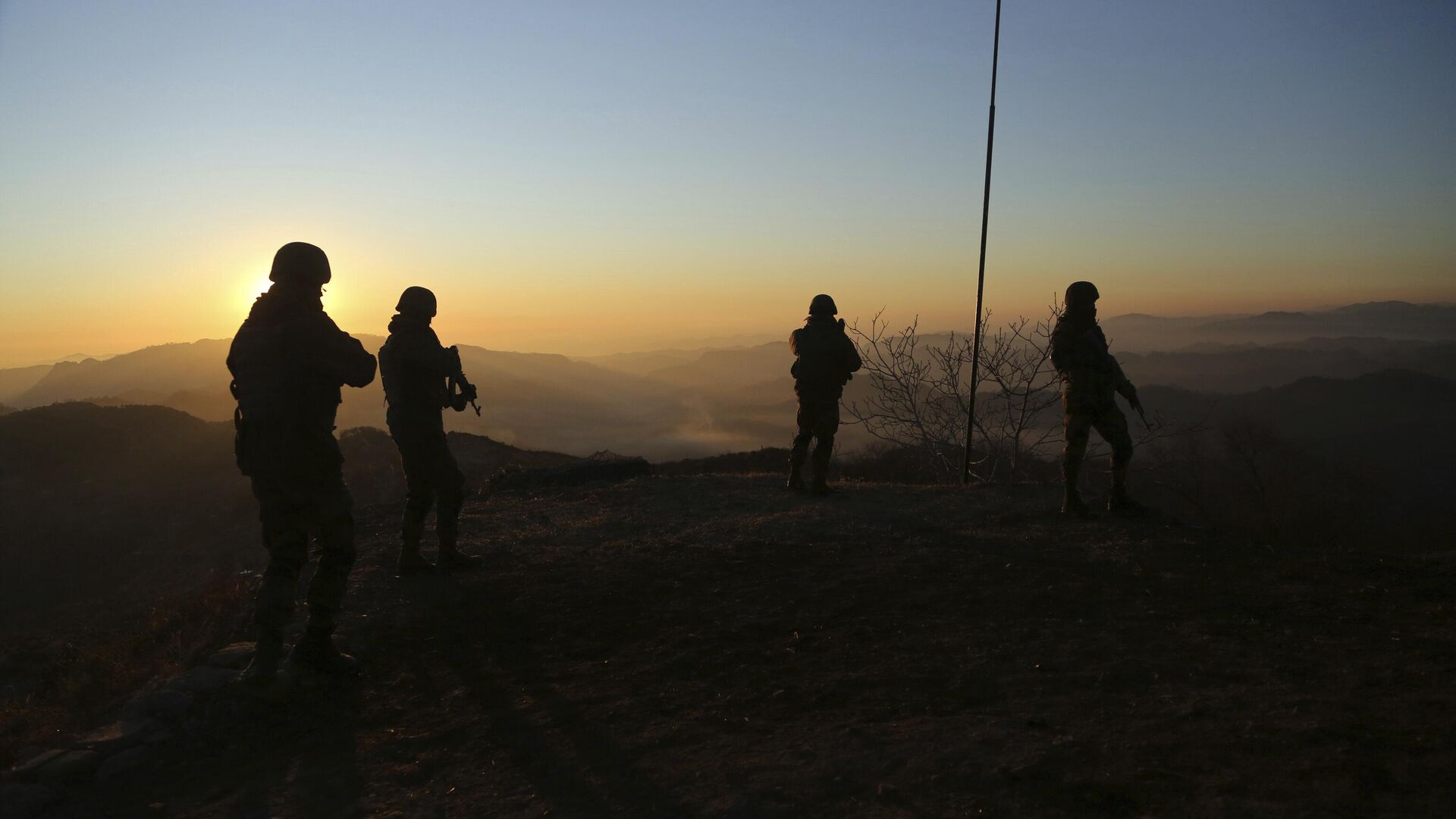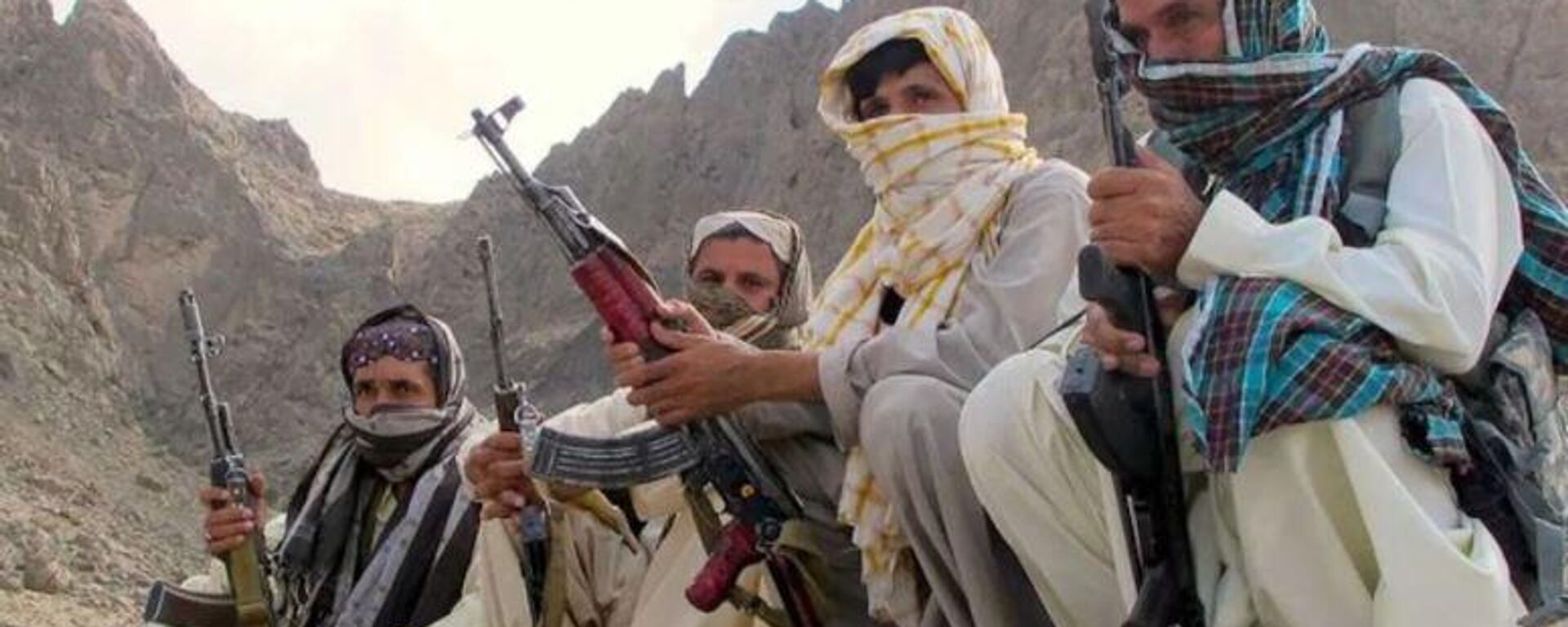https://sputniknews.in/20250403/whats-brewing-at-india-pakistan-border-8937462.html
What's Brewing at India-Pakistan Border?
What's Brewing at India-Pakistan Border?
Sputnik India
The latest episode of ceasefire violation along the Line of Control (LoC) is another example of the unending proxy war against India, experts have told Sputnik... 03.04.2025, Sputnik India
2025-04-03T08:47+0530
2025-04-03T08:47+0530
2025-04-03T08:47+0530
sputnik opinion
sheikh hasina
pakistan
india
jammu
tehreek-e-taliban pakistan (ttp)
baloch liberation army (bla)
islamabad
delhi
new delhi
https://cdn1.img.sputniknews.in/img/07e8/01/0d/6196061_0:160:3072:1888_1920x0_80_0_0_967f71c9e16e8af610452b72f5d7831a.jpg
Indian and Pakistani troops engaged in cross-border firing in the Poonch district of Jammu and Kashmir on April 1, sending tensions soaring in the region.Irrespective of what is happening on Pakistan's Western border, they would like the "strategic assets" to remain active in Kashmir for as long as possible. In other words, this is not a provocation rather than a "helping hand to the terrorists" sneaking into Kashmir, Asthana underscored.The fact of the matter is that the Pakistan Army is coming under a lot of pressure within its own country and is being discredited sufficiently because the militants linked with the Tehreek-e-Taliban Pakistan (TTP*) and the Baloch Liberation Army (BLA) are striking them hard. Being constantly targeted, the Pakistan Army suffers reputational damage.Despite the 2021 agreement to abide by the 2003 ceasefire, there has been an uptick in the incidents of violations on the LoC. The firing on April 1 that occurred after a mine blast in the Krishna Ghati sector only added to the series of ceasefire violations in January and February this year, believes Dr. Priyanka Singh, an Associate Fellow at the New Delhi-based military think tank Manohar Parrikar Institute for Defence Studies and Analyses (MP-IDSA).In total, at least 6 violations have taken place. They are part of Pakistan's strategy to undermine the sanctity of the LoC in the Jammu region -- particularly Jammu, Poonch and Rajouri, believes Singh.These attacks have happened in heavily forested areas that allow sufficient camouflage for infiltration attempts, Singh suggested.There has been a sharp decline in Pakistan's geopolitical importance after the US withdrawal from Afghanistan in August 2021. The country is embroiled in an economic crisis that refuses to subside. Its internal situation is disarrayed due to political turmoil and security threats, especially in Balochistan (separatists) and Khyber Pakhtunkhwa (terror attacks).
https://sputniknews.in/20250321/what-fuels-separatist-insurgency-in-pakistans-balochistan-8881099.html
pakistan
india
jammu
islamabad
delhi
new delhi
kashmir valley
jammu and kashmir (j&k)
Sputnik India
feedback.hindi@sputniknews.com
+74956456601
MIA „Rossiya Segodnya“
2025
Pawan Atri
https://cdn1.img.sputniknews.in/img/07e6/0c/13/139630_147:0:831:684_100x100_80_0_0_8fa2b25903e7787fe6a2698552c167df.png
Pawan Atri
https://cdn1.img.sputniknews.in/img/07e6/0c/13/139630_147:0:831:684_100x100_80_0_0_8fa2b25903e7787fe6a2698552c167df.png
News
en_IN
Sputnik India
feedback.hindi@sputniknews.com
+74956456601
MIA „Rossiya Segodnya“
Sputnik India
feedback.hindi@sputniknews.com
+74956456601
MIA „Rossiya Segodnya“
Pawan Atri
https://cdn1.img.sputniknews.in/img/07e6/0c/13/139630_147:0:831:684_100x100_80_0_0_8fa2b25903e7787fe6a2698552c167df.png
sheikh hasina, pakistan, india, jammu, tehreek-e-taliban pakistan (ttp), baloch liberation army (bla), islamabad, delhi, new delhi, kashmir conflict, kashmir valley, jammu and kashmir (j&k), border dispute, border clashes, cross-border terrorism
sheikh hasina, pakistan, india, jammu, tehreek-e-taliban pakistan (ttp), baloch liberation army (bla), islamabad, delhi, new delhi, kashmir conflict, kashmir valley, jammu and kashmir (j&k), border dispute, border clashes, cross-border terrorism
What's Brewing at India-Pakistan Border?
The latest episode of ceasefire violation along the Line of Control (LoC) is another example of the unending proxy war against India, experts have told Sputnik India.
Indian and Pakistani troops engaged in cross-border firing in the Poonch district of Jammu and Kashmir on April 1, sending tensions soaring in the region.
"For infiltrating the terrorists, the best methodology as per the Pakistan Army is to start unprovoked firing on Indian positions, which would draw a sharp response from Indian forces. This is done because whenever there is a firing and retaliation, the chances of the detection of the infiltrators are lesser, and therefore, the Indian Army always finds that whenever the Pakistanis wish to send terrorists into India, that is the time, they launch such cross-fire exchanges," believes Major General (Retd) Shashi Bhushan Asthana.
Irrespective of what is happening on Pakistan's Western border, they would like the "strategic assets" to remain active in Kashmir for as long as possible. In other words, this is not a provocation rather than a "helping hand to the terrorists" sneaking into Kashmir, Asthana underscored.
The fact of the matter is that the Pakistan Army is coming under a lot of pressure within its own country and is being discredited sufficiently because the militants linked with the Tehreek-e-Taliban Pakistan (TTP*) and the Baloch Liberation Army (BLA) are striking them hard. Being constantly targeted, the Pakistan Army suffers reputational damage.
"So in order to deflect the Pakistani public's attention from the alarming situation in Balochistan and Khyber Pakhtunkhwa, the Pakistani Army carries out these actions on the Indian border. All this is part of its information warfare and propaganda, which they would like to propagate in their nation, highlighting that 'India is a threat to Pakistan' and it is India that violated the ceasefire agreement," the strategic affairs analyst highlighted.
Despite the 2021 agreement to abide by the 2003 ceasefire, there has been an uptick in the incidents of violations on the LoC. The firing on April 1 that occurred after a mine blast in the Krishna Ghati sector only added to the series of ceasefire violations in January and February this year, believes Dr. Priyanka Singh, an Associate Fellow at the New Delhi-based military think tank Manohar Parrikar Institute for Defence Studies and Analyses (MP-IDSA).
In total, at least 6 violations have taken place. They are part of Pakistan's strategy to
undermine the sanctity of the LoC in the Jammu region -- particularly Jammu, Poonch and Rajouri, believes Singh.
These attacks have happened in heavily forested areas that allow sufficient camouflage for infiltration attempts, Singh suggested.
"The attack in Krishna Ghati is a grim reminder of what happened in the bus attack in Reasi last year and Gulpur in February 2025. The increasing number of attacks in the newer sectors in the Jammu region reflects a change of tact by Pakistan in an effort to sustain focus on J&K, which has otherwise remained comparatively stable after the abrogation of Article 370 in August 2019," Singh emphasised.
There has been a sharp decline in Pakistan's geopolitical importance after the US withdrawal from Afghanistan in August 2021. The country is embroiled in an economic crisis that refuses to subside. Its internal situation is disarrayed due to political turmoil and security threats, especially in Balochistan (separatists) and Khyber Pakhtunkhwa (terror attacks).
"Therefore, to keep its pot boiling, especially on the issue of Kashmir, Pakistan is indulging more in its habitual practices of ceasefire violations that have had a certain nuisance value in its ties with India. On the broader geopolitical plane, Pakistan is seen attempting to engage with the present [government of Bangladesh], which could also be perceived as an effort to cause some strategic discomfiture for India," the geopolitical specialist concluded.



